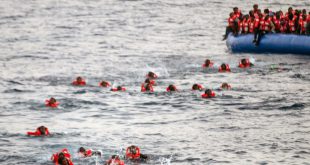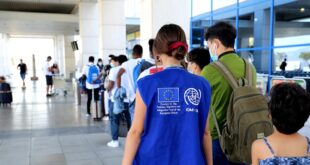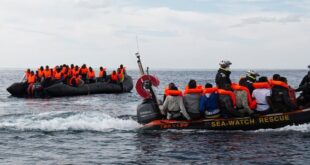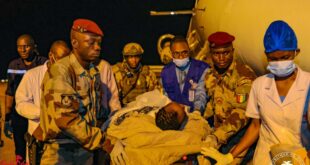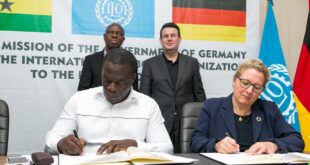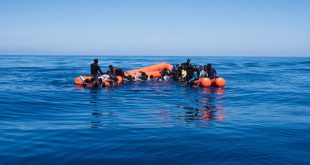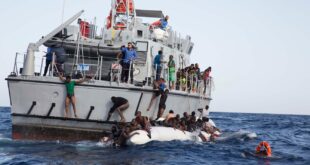When 19-year-old Fatim Jawara embarked on a dangerous journey across the Saharan desert in 2016, her goal was to make it big as a footballer in Europe. But the aspiring athlete from the Gambia never got to follow her dreams: Her life ended when the dinghy she travelled on sank in the Mediterranean Sea. The memory of her lives on in her football team in the Gambia. Irene Caselli* reports
Fatim Jawara had reached the top of her game in The Gambia. She was the goalkeeper of the national team and also played for the Red Scorpions, one of the strongest teams in the country’s female league.
Her daily routine was similar to that of many other Gambian teenagers: She helped out preparing food and looked after her nieces and nephews in her family compound, and talked to her friends on WhatsApp. The difference was that most of her routine revolved around football: When she wasn’t training or playing a game, she daydreamed of making it big as a football player in Europe.
Her career had started with a bang: At age 15, she represented her country in the Under-17 World Cup in Azerbaijan. But the team did not make it past the group stage and lost by a big margin in each game. But Fatim and most of the girls in her team didn’t mind that much — the worldwide competition represented the first chance to travel abroad and to be immersed in an international context.

After the World Cup, the government gave prizes to all players, including Fatim. She gave that money to her mother to build a bigger house in the crowded family compound: Fatim’s mother lived with her father and his other three wives, dozens of children and grandchildren.
Constant criticism
“She’s a happy girl, she loved dancing,” says Momodou Jawara, Fatim’s older brother. “She was so sweet, anyway.” Momodou shifts between the present and past tenses when talking about his younger sister, as if he could not fully accept that she is no longer around. Being almost 20 years older than Fatim, Momodou always made sure that his younger sister was doing well.
But life was far from easy for the teenager: She earned no salary from football, which is still developing for women in The Gambia, and had big dreams. She also faced constant criticism from neighbours who thought her appearance was too manly. She also came up against the cultural barriers that make women’s lives in the West African country particularly challenging.
“Fatim was kind of strange in the family,” says Momodou. “In The Gambia, if you act like that, they look at you as a lesbian, even if you’re not. And everyone knows the tradition: If you are a lesbian, you are put aside, they don’t even want to talk about you.”
Momodou convinced their mother to let Fatim play, even though there was a lot of criticism because their father was a well-respected imam in Serekunda, outside the capital city Banjul.
In 2016, Fatim was 19 years old. One day, she decided to leave The Gambia, together with her friend Chaat. She lied to her family about her plans, saying she was going to Senegal for a game. But she did tell her friend and teammate Pullo Bah.
“She was honest to me, she told me before going, this is the way I want to take,” Bah says. “She wanted to take football to another level, she wanted to help a little bit with her parents. That was her dream: to become a professional in the European leagues, to improve her football.”
Taking the ‘back way’
Bah still plays with the Red Scorpions and is visibly affected by her friend’s decision – even if time has passed already. “I tried to convince her to stay. Then I gave her goodbye, safe journey, yeah. I cried, I cried. Big cry.”
Fatim took what’s called “the back way” into Europe – this is how Gambians describe the route that thousands of people take if they don’t have a visa. It is a long, dangerous and expensive journey. It can cost several thousand dollars, most of which goes to smugglers along the way.
Fatim and her friend Chaat had apparently saved money for the trip. They went from The Gambia into Senegal, Mali, Burkina Faso and Niger, crossing the Sahara desert, all the way to the Libyan coast.

In 2016, when Fatim made this trip, thousands of Gambians attempted the same journey. With a population of around 2 million inhabitants, The Gambia relies heavily on remittances from abroad, which represent 15% of its GDP, according to the World Bank.
For a few years, Gambians were consistently one of the top 10 nationalities taking boats across the Mediterranean, according to 2017 arrivals data released by UNHCR. (The numbers have gone down now, and now Gambians are not even in the top 20 nationalities of arrival.) Many decided to leave because of the economic and political hardships of Yahya Jammeh’s 22-year autocratic regime, which came to an end in early 2017.
Alhagie Sisay is one of the thousands that got stranded in a Libyan detention center on his way to Europe. He is also one of the last people who saw Fatim Jawara. It was his second time attempting the trip the back way. Both times, he failed to make it to Europe.
Waiting to be pushed out to sea
“Fatim was not in a good mood. Because she told me that: If she had known that the road was like this, she would never take this road. But she didn’t know,” he said.
Fatim, Chaat and Sisay stayed in the same safe house before the two girls went on the connection. “The connection” is where people wait to be pushed out to sea in inflatable boats, trying to reach the shores of Italy.
The International Organisation for Migration’s Missing Migrants project calculates that over 16,000 people have died in the Mediterranean trying to make this journey since 2014.
Fatim Jawara and her friend Chaat were among those. On 27 October 2016, they died in the Mediterranean, as the inflatable boat that carried them and dozens of others capsized.
A year after her death, the then vice-president and minister responsible for women’s affairs, Fatoumata Jallow-Tambajang, said in an interview that a sport competition would be instated in the name of Fatim. “Looking at Fatim’s background, with the opportunities in Europe which she was driving at, she would have succeeded to be a shining star. I really want to champion her cause for her not to be forgotten, to become a symbol of hope for the youths,” she said.
But Jallow-Tambajang was relieved of her duty in June 2018. No competition was sponsored in Fatim’s name.
But her memory lives on in her football team, the Red Scorpions.
“I miss her everywhere, at home, sometimes we go there for weekends, sometimes we go for a walk, I miss her in all those places. Yeah. When coming for training, when going back home, having fun. Yeah. I miss her very much,” says Bah.
© InfoMigrant
*The reporting for this story was done in conjunction with Claudia Jardim and Mariangela Maturi as part of A Girls’ Game, a multimedia project that was funded by the European Journalism Centre’s Innovation in Development Reporting Grant.
 THE AFRICAN COURIER. Reporting Africa and its Diaspora! The African Courier is an international magazine published in Germany to report on Africa and the Diaspora African experience. The first issue of the bimonthly magazine appeared on the newsstands on 15 February 1998. The African Courier is a communication forum for European-African political, economic and cultural exchanges, and a voice for Africa in Europe.
THE AFRICAN COURIER. Reporting Africa and its Diaspora! The African Courier is an international magazine published in Germany to report on Africa and the Diaspora African experience. The first issue of the bimonthly magazine appeared on the newsstands on 15 February 1998. The African Courier is a communication forum for European-African political, economic and cultural exchanges, and a voice for Africa in Europe.




